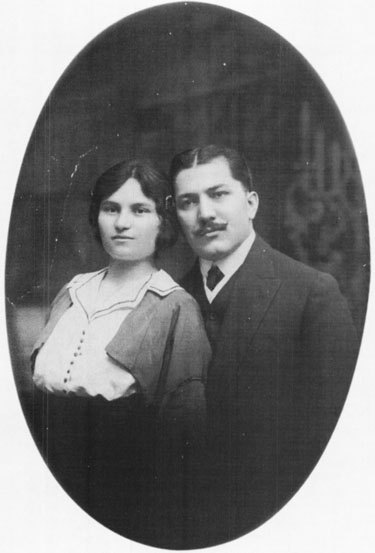I Have Landed (5 page)
Authors: Stephen Jay Gould

My kind and diligent reader then bestowed an additional gift upon me by locating Farkas's manifest as well. He had arrived, along with eight hundred passengers in steerage, aboard the sister ship SS
Southwark
on June 13, 1900, listed as Farkas Rosenberg, illiterate at age thirty-four (although I am fairly sure that he could at least read and probably write Hebrew) and sponsored by a cousin named Jos. Weiss (but unknown to my family, and perhaps an enabling fiction). Farkas, a carpenter by trade, arrived alone with one dollar in his pocket.
Papa Joe's later story mirrors the tale of several million poor immigrants to a great land that did not welcome them with open arms (despite Lady Liberty's famous words), but also did not foreclose the possibility of success if they could
prevail by their own wits and unrelenting hard work. And who could, or should, have asked for more in those times? Papa Joe received no further schooling in America, save what experience provided and internal drive secured. As a young man, he went west for a time, working in the steel mills of Pittsburgh and on a ranch somewhere in the Midwest (not, as I later found out, as the cowboy of my dreams, but as an accountant in the front office). His mother, Leni, died young (my mother, Eleanor, bears her name in remembrance), as my second book of his legacy testifies. Papa Joe ended up, along with so many Jewish immigrants, in the garment district of New York City, where, after severing his middle finger in an accident as a cloth cutter, he eventually figured out how to parlay his remarkable, albeit entirely untrained, artistic talents into a better job that provided eventual access to middle-class life (and afforded much titillation to his grandchildren)âas a designer of brassieres and corsets.

Partial page of the passenger manifest for my grandfather's arrival in America on September 11, 1901. He is listed (as Josef Rosenberg) along with his mother, Leni, and his two younger sisters (my aunts Gus and Regina)
.
He met Irene, also a garment worker, when he lived as a boarder at the home of Irene's auntâfor she had emigrated alone, at age fourteen in 1910, after a falling-out with her father, and under her aunt's sponsorship. What else can one say for the objective record (and what richness and depth could one
not
expose, at least in principle, and for all people, at the subjective level of human life, passion, and pure perseverance)? Grammy and Papa Joe married young, and their only early portrait together radiates both hope and uncertainty. They raised three sons and a daughter; my mother alone survives. Two of their children finished college.
Somehow I always knew, although no one ever pressured me directly, that the third generation, with me as the first member thereof, would fulfill the
deferred dream of a century by obtaining an advanced education and entering professional life. (My grandmother spoke Hungarian, Yiddish, German, and English, but could only write her adopted language phonetically. I will never forget her embarrassment when I inadvertently read a shopping list that she had written, and realized that she could not spell. I also remember her joy when, invoking her infallible memory and recalling some old information acquired in her study for citizenship, she won ten dollars on a Yiddish radio quiz for correctly identifying William Howard Taft as our fattest president.)

Papa Joe's prayer book recording the death of his mother in 1911
.
I loved Grammy and Papa Joe separately. Divorce, however sanctioned by their broader culture, did not represent an option in their particular world. Unlike Hal and Nettie Huxley, I'm not at all sure that they would have done it again. But they stuck together and prevailed, at least in peace, respect, and toleration, perhaps even in fondness. Had they not done so, I would not be hereâand for this particular twig of evolutionary continuity I could not be more profoundly grateful in the most ultimate of all conceivable ways. I also loved them fiercely, and I reveled in the absolute certainty of their unquestioned blessing and unvarying support (not always deserved of course, for I really did throw that rock at Harvey, even though Grammy slammed our front door on Harvey's father, after delivering a volley of Yiddish curses amid proclamations that her Stevele would never do such a thingâwhile knowing perfectly well that I surely could).
The tree of all life and the genealogy of each family share the same topology and the same secret of success in blending two apparently contradictory themes of continuity without a single hair's breadth of breakage, and change without a moment's loss of a potential that need not be exploited in all episodes but must remain forever at the ready. These properties may seem minimal, even derisory, in a universe of such stunning complexity (whatever its inexplicable eternity or infinity). But this very complexity exalts pure staying power (and the lability that facilitates such continuity). Showy statues of Ozymandias quickly become lifeless legs in the desert; bacteria have scuttled around all the slings and arrows of outrageous planetary fortune for 3.5 billion years and running.
I believe in the grandeur of this view of life, the continuity of family lines, and the poignancy of our stories: Nettie Heathorn passing Tasso's torch as Granmoo two generations later; Papa Joe's ungrammatical landing as a stranger in a strange land and my prayer that, in some sense, he might see my work as a worthy continuation, also two generations later, of a hope that he fulfilled in a different way during his own lifetime. I suspect that we feel the poignancy in such continuity because we know that our little realization of an unstated family promise somehow mirrors the larger way of all life, and therefore
becomes “right” in some sense too deep for words or tears. I can therefore write the final essay in this particular series because I know that I will never run out of unkept promises, or miles to walk; and that I may even continue to sprinkle the journey remaining before sleep with a new idea or two. This view of life continues, flowing ever forward, while the current patriarch of one tiny and insignificant twig pauses to honor the inception of the twig's centennial in a new land, by commemorating the first recorded words of a fourteen-year-old forebear.

Grammy and Papa Joe, soon after their wedding, circa 1915
.
Dear Papa Joe, I have been faithful to your dream of persistence, and attentive to a hope that the increments of each worthy generation may buttress the continuity of evolution. You could speak those wondrous words right at the joy and terror of inception. I dared not repeat them until I could fulfill my own childhood dreamâsomething that once seemed so mysteriously beyond any hope of realization to an insecure little boy in a garden apartment in Queensâto become a scientist and to make, by my own effort, even the tiniest addition to human knowledge of evolution and the history of life. But now, with my step 300, so fortuitously coincident with the world's new 1,000 and your own 100,
3
perhaps I have finally won the right to restate your noble words, and to tell you that their inspiration still lights my journey: I have landed. But I also can't help wondering what comes next!
Disciplinary Connections: Scientific Slouching Across a Misconceived Divide
2
No Science Without Fancy, No Art Without Facts: The Lepidoptery of Vladimir Nabokov
The Paradox of Intellectual Promiscuity
N
O
ONE EVER ACCUSED
F
RANCIS
B
ACON
OF MODESTY, BUT
when England's lord chancellor proclaimed his “great instauration” of human understanding and vowed to take all knowledge as his province, the stated goal did not seem ludicrously beyond the time and competence of a great thinker in Shakespeare's age. But as knowledge exploded, and then fragmented into disciplines with increasingly rigid and self-policed boundaries, the restless scholar who tried to operate in more than one domain became an object of suspicionâeither a boastful pretender across the board (“jack of all and master of none,” in the old cliché), or a troublesome dilettante
in an alien domain, attempting to impose the methods of his genuine expertise upon inappropriate subjects in a different world.
We tend toward benign toleration when great thinkers and artists pursue disparate activities as a harmless hobby, robbing little time from their fundamental achievements. Goethe (and Churchill, and many others) may have been lousy Sunday painters, but Faust and Werther suffered no neglect thereby. Einstein (or so I have heard from people with direct experience) was an indifferent violinist, but his avocation fiddled little time away from physics.
However, we grieve when we sense that a subsidiary interest stole precious items from a primary enterprise of great value. Dorothy Sayers's later theological writings may please aficionados of religion, but most of her devout fans would have preferred a few more detective novels featuring the truly inimitable Lord Peter Wimsey. Charles Ives helped many folks by selling insurance, and Isaac Newton must have figured out a thing or two by analyzing the prophetic texts of Daniel, Ezekiel, and Revelationâbut, all in all, a little more music or mathematics might have conferred greater benefit upon humanity.
Therefore, when we recognize that a secondary passion took substantial time from a primary source of fame, we try to assuage our grief over lost novels, symphonies, or discoveries by convincing ourselves that a hero's subsidiary love must have informed or enriched his primary activityâin other words, that the loss in quantity might be recompensed by a gain in quality. But such arguments may be very difficult to formulate or sustain. In what sense did Paderewski become a better pianist by serving as prime minister of Poland (or a better politician by playing his countryman Chopin)? How did a former career in major-league baseball improve (if we give a damn, in this case) Billy Sunday's evangelical style as a stump preacher? (He sometimes began sermonsâI am not making this upâby sliding into the podium as an entering gesture.)
No modern genius has inspired more commentary in this mode than Vladimir Nabokov, whose “other” career as a taxonomist of butterflies has inspired as much prose in secondary criticism as Nabokov ever lavished upon Ada, Lolita, and all his other characters combined. In this case in particularâbecause Nabokov was no dilettante spending a few harmless Sunday hours in the woods with his butterfly net, but a serious scientist with a long list of publications and a substantial career in entomologyâwe crave some linkage between his two lives, some way to say to ourselves, “We may have lost several novels, but Nabokov spent his entomological time well, developing a vision and approach that illuminated, or even transformed, his literary work.” (Of course, speaking parochially, professional taxonomists, including the author of this
essay, might regret even more the loss of several monographs implied by Nabokov's novels!)
To allay any remaining suspicions among the literati, let me assure all readers about a consensus in my professional community: Nabokov was no amateur (in the pejorative sense of the term), but a fully qualified, clearly talented, duly employed professional taxonomist, with recognized “world class” expertise in the biology and classification of a major group, the Latin American Polyommatini, popularly known to butterfly aficionados as “blues.”
